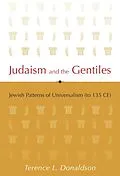In the Second-Temple period non-Jews were attracted to Judaism's communal life, religious observance and theological imagination. On the Jewish side, this was matched by the development of several discrete "patterns of universalism"-ways in which Jews were able to conceive of a positive place for Gentiles within their symbolic world. In this book Terence Donaldson collects and comments on all of the texts (to the end of the second Jewish rebellion in 135 CE) that deal with Gentile sympathizers, proselytes, ethical monotheists and participants in end-time redemption. In impressive detail, Donaldson identifies, defines, and describes these "patterns of universalism."
Autorentext
Terence L. Donaldson
Inhalt
Preface
Acknowledgments
Abbreviations
1. Introduction
Part I: Texts and Commentary
2. Scripture, Septuagint and Apocrypha
3. Pseudepigrapha
4. Qumran
5. Philo
6. Josephus
7. Greco-Roman Literature
8. Early Christian Literature
9. Inscriptions
Part II: Patterns of Universalism
10. Sympathization
11. Conversion
12. Ethical Monotheism
13. Participation in Eschatological Salvation
14. Conclusion
Bibliography
Indices
